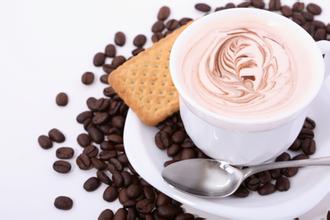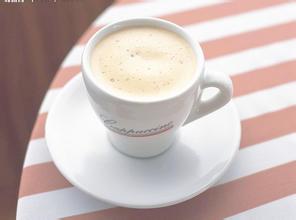Introduction to Jamaican Blue Mountain Coffee Fine Coffee from Jamaica Alpine Coffee
The United States is a coffee-loving country, but reporters in Houston several major supermarket chains and Starbucks coffee shops did not find "coffee beauty" trace. Starbucks coffee in downtown Houston is made mainly from beans grown in Africa, Colombia or Indonesia, according to a waiter. Blue Mountain coffee is relatively rare in the market, 90% of Blue Mountain coffee is occupied by Japanese. At present, the market to see the "Blue Mountain" coffee does not contain a positive Blue Mountain coffee beans. There is a "Jamaica Blue Mountain Blend" coffee that is a blend of 30% Blue Mountain coffee and 70% of the best Jamaica alpine coffee. Both of these coffees try to mimic the taste of Blue Mountain coffee, but they can't reach the perfect state. In addition, Blue Mountain coffee is also processed very carefully. Strict and detailed standards have been formulated for processing, baking, packaging, etc., and there are regulations on what organic fertilizers need to be used during the growth period. All are harvested manually. Jamaica was also the last country to still ship coffee in traditional barrels.
Only after this series of stringent standards stipulated by the Jamaica Coffee Industry Board can coffee obtain a government certificate of guarantee. The official name of Blue Mountain Coffee can maintain its excellent status today, which is also inseparable from local business policies. In 1932, Jamaica adopted a policy to encourage coffee production, reducing the island's dependence on sugar exports. The local government did not plant a large number of high-quality coffee in order to increase production value, as most coffee-producing countries did. Instead, it preferred quality to be superior, preferring to sacrifice coffee production to ensure the quality of blue mountain coffee. As a result, Jamaica is currently one of the world's low coffee producers. Brazil, the world's largest coffee exporter, produces 30 million bags of coffee every year, while Blue Mountain Coffee produces only about 40,000 bags of pure Jamaica Blue Mountain Coffee perfectly blends the unique sour, bitter, sweet and alcoholic flavors of coffee to form a strong and attractive elegant flavor that is unmatched by other coffees. Blue Mountain coffee lovers say: "It's a coffee beauty with all the advantages of good coffee in one." Jim, general manager of Pitt's Coffee and Tea Company, described Blue Mountain coffee as "aromatic, smooth, mellow, and precious to me." It is precisely because the taste of Blue Mountain Coffee is moderate and perfect, so Blue Mountain Coffee is generally drunk in the form of black coffee. The unique flavor of Blue Mountain Coffee is related to the unique geographical location and climatic conditions of Blue Mountain. Blue Mountain is located in the coffee belt between 25 degrees north latitude and 25 degrees south latitude, with fertile new volcanic soil, fresh air, no pollution, rainy all year round, and large temperature difference between day and night. The most important thing is that every afternoon, clouds cover the whole mountain top, not only for coffee trees natural shade, but also can bring abundant moisture, so that Blue Mountain coffee taste and aroma outstanding.
Only coffee grown in the Blue Mountains above 1800 meters above sea level can be called Blue Mountain Coffee. A coffee enthusiast whom the reporter knew in the United States was more demanding, insisting that "coffee grown at an altitude of 2256 meters is Blue Mountain coffee." Coffee beans grown in the lower mountains of Jamaica can only be named "Jamaica Alpine Coffee" because of their different qualities. Moreover, the same coffee tree species, whether grown in Hawaii, Kenya, Papua New Guinea or anywhere else with similar climates, did not produce the flavor of Blue Mountain coffee beans.

Important Notice :
前街咖啡 FrontStreet Coffee has moved to new addredd:
FrontStreet Coffee Address: 315,Donghua East Road,GuangZhou
Tel:020 38364473
- Prev

Tanzania Coffee Flavor and Taste introduction Kilimanjaro Coffee Bean
Tanzanian coffee was first introduced by Christian neighboring Kenya, and began to be planted at the foot of Mount Kilimanjaro. Some coffee trees are more than 100 years old. In the past, the Tanzanian coffee industry has been dominated by manor cultivation. Now more than 55% are grown by small farmers. Many small farmers form cooperative organizations, the most important of which is the Kilimanjaro Cooperative Federation.
- Next

Smooth taste Peruvian coffee flavor Introduction Peruvian organic coffee boutique coffee beans
Peru's coffee cultivation is planned, which greatly increases coffee production. Its rich acidity and mellow smoothness are its most striking features. Peruvian coffee has a mild acidity, medium texture, good taste and aroma, and is an indispensable ingredient in making mixed coffee. Excellent Peruvian coffee with a rich aroma, smooth, structured and rich taste
Related
- Detailed explanation of Jadeite planting Land in Panamanian Jadeite Manor introduction to the grading system of Jadeite competitive bidding, Red bid, Green bid and Rose Summer
- Story of Coffee planting in Brenka region of Costa Rica Stonehenge Manor anaerobic heavy honey treatment of flavor mouth
- What's on the barrel of Blue Mountain Coffee beans?
- Can American coffee also pull flowers? How to use hot American style to pull out a good-looking pattern?
- Can you make a cold extract with coffee beans? What is the right proportion for cold-extracted coffee formula?
- Indonesian PWN Gold Mandrine Coffee Origin Features Flavor How to Chong? Mandolin coffee is American.
- A brief introduction to the flavor characteristics of Brazilian yellow bourbon coffee beans
- What is the effect of different water quality on the flavor of cold-extracted coffee? What kind of water is best for brewing coffee?
- Why do you think of Rose Summer whenever you mention Panamanian coffee?
- Introduction to the characteristics of authentic blue mountain coffee bean producing areas? What is the CIB Coffee Authority in Jamaica?

